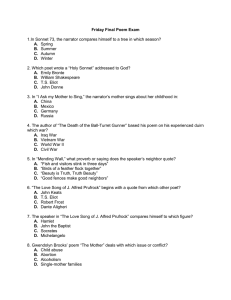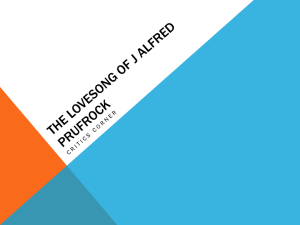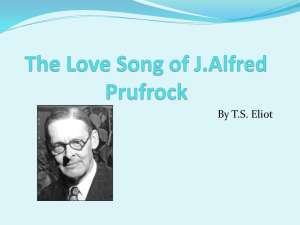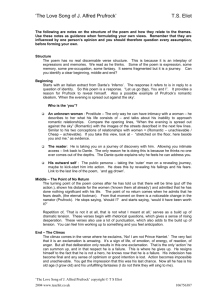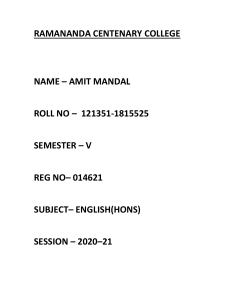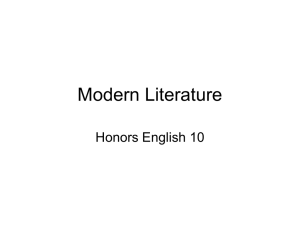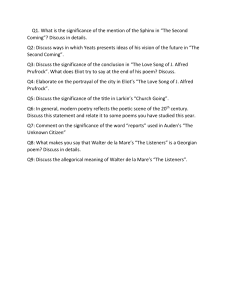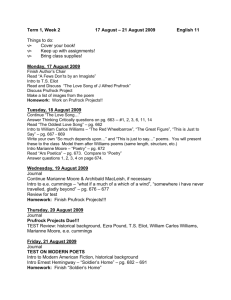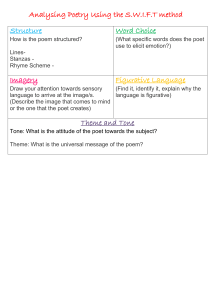Uploaded by
Asst. Inst. Ghada Majid Ahmed
Themes in T.S. Eliot's 'Love Song of J. Alfred Prufrock'
advertisement
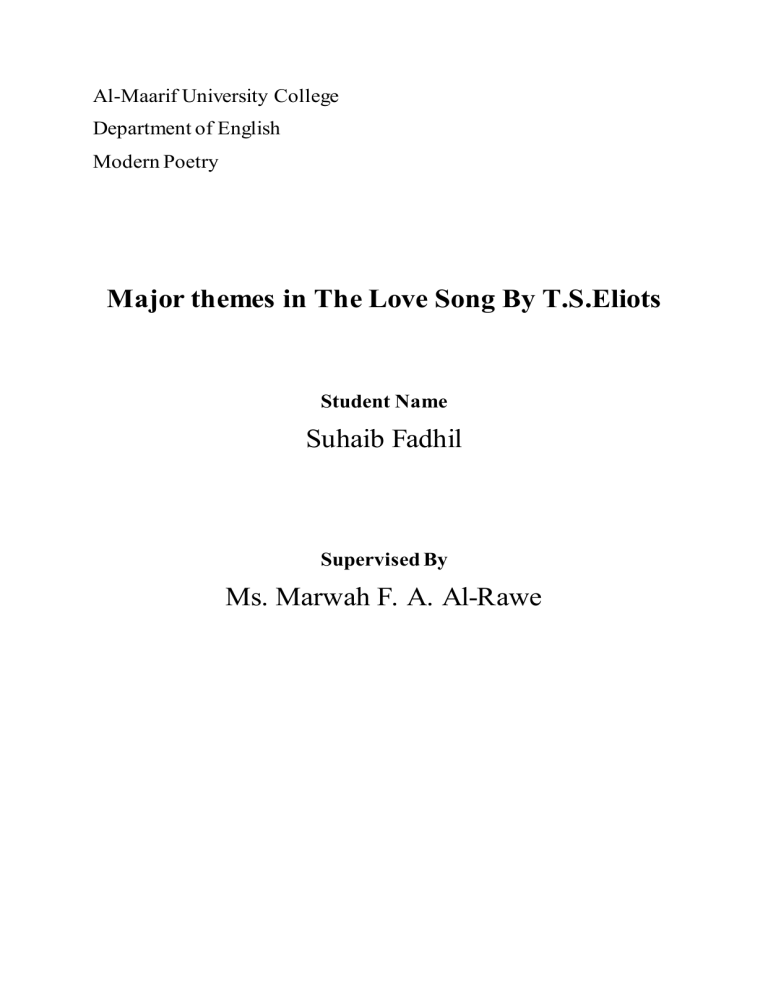
Al-Maarif University College
Department of English
Modern Poetry
Major themes in The Love Song By T.S.Eliots
Student Name
Suhaib Fadhil
Supervised By
Ms. Marwah F. A. Al-Rawe
1. Theme of Spiritual Loss
……….. Do I dare to eat a peach? (I.122).
A superficial reading of this line may denote that Prufrock is never going to
express his passion to a woman whose love he seeks. Prufrock's real problem is
related to sex because "the peach, through shape and texture, has long been a
symbol for female genitalia".(Hence Prufrock's anxiety about eating a peach has
much to do with his feeling with sexual inadequacy".Peach, indeed, is a symbol
which is, somehow, related to sex in some cultures. It is "the Chinese symbol for
the immortality and marriage, as well as for femininity and in particular as a
feminine genitalia". It cannot be interpreted in a different way; it is not a
haphazard choice chosen by Prufrock. It is not related to the fear of some physical
harm (loss of a tooth) its pit may cause or else
2. Theme of Hesitation
Hence, from the starting lines of the poem Prufrock inserts the images of his
discontentment, awkwardness, hesitation, alienation and debasement which can
serve as an objective correlative for his emotion which he tries to hide it or at
least he does not want to express it openly but through certain devices. Hence,
objective correlative becomes a medium to say things indirectly.
3. Theme of Escapism
Prufrock does not forget about his already defeat; he still thinks about the
world of women which constantly refuses him. This knowledge results from
some of his physical defects, a matte which makes him hesitant:
And indeed there will be time
To wonder, "Do I dare?" and "Do I dare?"
Time to turn back and descend the stair,
With the bold spot in the middle of my hair
[They will say: "How his hair is growing thin!"]
(II. 37-41)
Hence, he lays a great deal of importance of what the women inside might say
about him and how they have penetrating looks, concerning man's physical
qualities.
4. Theme of Boredom
After all these disappointments, Prufrock asserts his overall boredom with life.
He says:
For I have known them already, known them all…
Have known the evenings,
mornings, afternoons, I have measured out my life with coffee spoons (II.49-51)
Accordingly, we can infer that Prufrock seems to feel as if his life were over and
he has no more to offer. He decides to go out and have a walk upon the beach and
listen to the songs of the mermaids who do not sing for him. He wishes to enter
in a trance or, in fact, to die: Till the human voice wake us, and we drown. (I.131)
5. Theme of Suffering
The ellipses which follow the image of the ragged claws in the middle of
the poem also function to represent the poet's suppression of painful thoughts.
The self-loathing and wish for oblivion implicit in his self image as a "pair of
ragged claws,/ scuttling across the floor of silent seas" (L. 73-74) are too
terrible for the poet of fact. According to the poet the atmosphere of modern
age becomes sick and every corner in the society breathes that sickness.
6. Theme of Death and War
The effects that the two world wars have left, are very brutal and poignant on
literature in general. Thus, the outcome of poetry in these wars is "considered part
and parcel of modern poetry"(3). This poignant impacts of these two world wars
are focused on the mentality of the modern poet and his way of thinking, feeling
and how he reacts toward the enormous changes which have taken place during
his time. He cannot even live peacefully since his sense of security has
disappeared. The war has "dispelled the dream of security which had lulled
{them}"
7. Theme of Loneliness
The first images which depict Prufrock as discontent fed up with his
surroundings lead to different images of loneliness and alienation. He
realizes his powerlessness and the limitation of his existence. His
selfawareness, Erick Fromm argues, has made him feel separate from
nature. This causes him pain and sorrow. He lives the loneliness. He is as
lonely as "those men whom he has watched" :
And watched the smoke that rises from the pipes Of lonely men in shirtsleeves, leaning out of windows (I.71-72)
The sense of isolation and alienation, sometimes, is deepened in the poem;
especially, when Prufrock meditates the contrast between his needs and the
social reality the thing that makes him neurotic if not mad. Frederick L.
Rusch argues that "Psyche forces [are] a process of constant interaction
between man's needs and the social and historical reality in which he
participates"
8. Theme of Love
At the end of the poem, we see the longing of the poet for more primitive and
mysterious life which is evoked by the mermaids. But the poet comes to realize
that even the mermaid's alluring song, which is very beautiful, is not for him. This
image conveys the poet's longing for beauty or, perhaps, love, but even this dream
lasts shortly. He again brings us back to the trivial chitchat, the "human voices"
which wake us from the lovely and mysterious fantasy, shown by the song of the
mermaids.
9. Theme of Fear
He, as noted by Grover Smith "is a dressing, as if looking into a mirror his
whole public personality".(19) As a result he refers to this practice of pinning
insect specimens for studying which suggests that he feels similarly
scrutinized. Again, Prufrock is extremely afraid of his appearance and thinks
that people comment on what he wears, and what is important and what he
looks like. Then comes the last animal image which is that of a crab where
Prufrock further descends to the "floors of silent seas":
I should have been a pair of ragged claws
Scuttling across the floors of silent seas. (II. 73 – 74).
What Prufrock wants, in this image, is not to hide himself or his physical
Fear from others only. He wants, in fact, death, "physical death, and the
poem…, is explicit about this desire.(20) What is worthmentioning is that the
images which debased Prufrock; specially, those of animals are depicted after
the hot topic of Michael Angelo, a very creative and intelligent man, all of
which Prufrock is not.
10. Theme of City
The city becomes the controlling focus of political, economic and cultural life.
Its scene in modern poetry is represented by cruelty, inhumanity, ugliness and
despair as hell. It is a place where people lose themselves. So, this modern
civilization teaches man how to kill instead of teaching him how to live peacefully
and safely. Thus, the more man becomes civilized, the more savage he becomes.
Therefore; civilization has left chronic touches on modern life in general.
References
Lawrence, Karen. The McGraw-Hill Guide to English Literature. Vol. 2
London: McGraw-Hill Publishing Company, 1985.
Lawrence, Karen. "Love Song of J. Alfred Prufrock Analysis". [www
Document] URL, http://www.litencyc.com.2006.
Renner, B. "Major Themes" (Prufrockian Paralysis) [www. Document], URL,
http://www.documentsandcorrelative.htm\. 2006.
